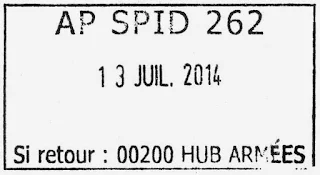DJIBOUTI SPID 262
Agence Postale Service Postal International pour la Défense
La Poste/SODEXO ouvraient l'agence postale de Djibouti en juillet 2014 à la fermeture du BPI 610.
LE CODE AP 262 EST UTILISÉ SUR LE CACHET TRODAT DE L'AP SPID
Ce cachet TRODAT rectangulaire est remplacé depuis le 29 août 2026 par un timbre à date circulaire de 30 mm avec une seule couronne extérieure.
AP SPID S62 Sodexo La Poste 00200 HUB ARMEES la date est encadrée par deux fois deux étoiles superposées
Le général commandant les forces françaises stationnées à Djibouti dispose d'un état-major interarmées. Il commande début 2015 environ 1 950 militaires, dont 1 400 permanents, appartenant à des unités pré-positionnées et tournantes qui constituent les forces de présence. Durant l'été 2015, l'effectif a diminué entre 1 650 et 1 750 personnes.
Les FFDj arment également le centre d’entraînement au combat et d’aguerrissement de Djibouti (CECAD). Ce centre accueille les unités permanentes ou en mission de courte durée des FFDj, les unités ou écoles de métropole, les forces djiboutiennes et étrangères.
http://www.defense.gouv.fr/ema/forces-prepositionnees/djibouti/dossier/les-forces-francaises-stationnees-a-djibouti
http://www.qualityoflifeobserver.com/lifeline-for-french-soldiers-abroad
DELIVERING MAIL: A LIFELINE FOR FRENCH SOLDIERS ABROAD
QUALITY OF LIFE OBSERVER
- DEFENSE
- DEC 11 2013In a partnership with La Poste, Sodexo is providing postal services to French military bases abroad. It is a crucial mission, as it contributes to raising the soldiers’ quality of life and boosting the troops’ morale.
Still in its deployment phase, the Sodexo – La Poste consortium is set to deliver mail and parcels to 35,000 soldiers in 11 French military bases in
- Germany,
- Afghanistan,
- Tajikistan,
- Lebanon,
- the United Arab Emirates,
- Chad,
- Djibouti,
- Gabon,
- Ivory Coast,
- the Central African Republic
- and Mali.
Expressing support for the troops
“Mail is a lifeline for soldiers,” says Veronika Roux, Sodexo Vice President for Defense, Continental Europe. “For military service personnel, the mail and parcels they exchange with their loved ones have a major impact on their quality of life.”Love letters, birthday cards from family and friends, or drawings from their children, for example, are more cherished by soldiers than phone calls or emails. The troops also receive many letters from French citizens eager to express their support for what they are doing for their country. “Soldiers always say how important such support is to them, and it makes their job more meaningful,” says Veronika.A welcome reminder of home
Parcels can weigh up to 20 kilograms and are just as eagerly awaited. “To give you an idea of volume, four tons of mail are distributed each week to soldiers in Kabul, Afghanistan,” says Veronika. And of course delivery peaks on dates such as Easter or Christmas.The packages often contain clothing items, video and board games, posters, DVDs, books, home-prepared meals in preserving jars or vacuum-sealed pouches, and various gifts. Such care packages represent great opportunities for barter: a DVD in exchange for a book, for example, or a regional sweet specialty traded for another. But above all, they provide soldiers with an all-important taste of home while they are deployed abroad. And by sharing some of the items they receive, soldiers can strengthen their friendships and help boost morale and cohesion within their unit.A key factor in retaining the best soldiers
Mail is so important for the wellbeing of soldiers that its delivery is almost on a 24/7 basis. “It is totally out of the question to deliver mail late or to the wrong soldier, because we know how significant the work we do is for them.” Indeed, opening up a letter or a parcel from home is “the best feeling in the world.”“Delivering mail works wonders not only for individual staff morale, but can also contribute to the troops’ collective efficiency and the overall success of military operations,” adds Veronika. “Mail is just as important as food: they are the two main ingredients of the troops’ morale.”Indeed, according to NATO, 30% of new army recruits do not complete their contract and 80% of premature departures are caused by issues in balancing family life and military duties. “In a professional army, the only way you can retain the best is by focusing on quality of life,” concludes Veronika.







